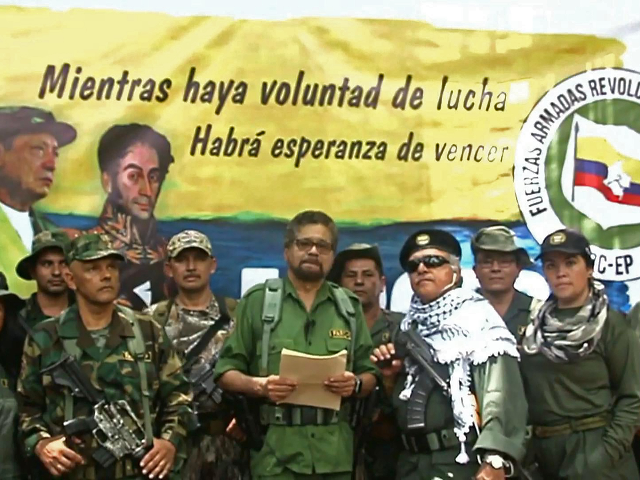The government of Colombia threatened to campaign for the United Nations to brand Cuba a state sponsor of terrorism if it did not hand over the leaders of the Marxist National Liberation Army (ELN) terrorist group, a letter published by Colombian media revealed on Tuesday.
The text of the letter, reproduced by the Colombian newspaper El Tiempo, cites the recent call to arms by another communist terrorist organization, the Revolutionary Armed Forces of Colombia (FARC), as the impetus for the demand to extradite Nicolás Rodríguez Bautista, alias “Gabino,” and Israel Ramírez Pineda, alias “Pablo Beltrán” – the leaders of the ELN currently taking refuge in Cuba.
“Jesús Santrich” and “Iván Márquez,” two senior leaders of the FARC, announced a truce with the ELN to cooperate in their war on the “oligarchy,” as they refer to the Colombian government. Santrich, a senator in the country’s most powerful legislative chamber as part of a 2016 peace deal, and Márquez made their call to arms in a video published online in late August.
The FARC signed a peace deal brokered by Cuba with Bogotá in 2016 that allowed them to become a legal political party and granted them uncontested legislative seats, an unconstitutional move as the Colombian people voted against the deal in a national referendum. Despite the fact that only one senior FARC leader – the president of the political party, “Timochenko” – has not returned to terrorism, Colombian media refer to the large Santrich and Márquez faction as FARC “dissidents.”
Colombia’s Foreign Affairs Ministry noted in its letter to Havana that the FARC war on the Colombian people – which has so far taken the lives of two rural mayoral candidates and several other local politicians and relatives – elevates the urgency of bringing the ELN leaders to justice.
The ministry describes the Santrich and Márquez terrorism announcement as the “creation of a criminal group” that “violates their responsibilities within the peace deal” between the Colombian government and the FARC.
“Those who now turn their backs and betray the agreement they helped build announce an alliance with the National Liberation Army (ELN) terrorist group,” the letter read, “whose top leaders … are now located in the Republic of Cuba.”
The letter notes that Bogotá has acquired Interpol “red notices” for the individuals in question, which urge the extradition of any country aware that they are present within its borders. Colombia formally requested their extradition in January, but the Castro regime has ignored the request.
“The Republic of Colombia demands that the Republic of Cuba immediately hand all members of the ELN present in Cuban territory over to our judicial authorities,” the letter continued. If Cuba does not respond to the request, the foreign ministry wrote it would have to invoke United Nations Security Council Resolution 1373, a document passed shortly after September 11, 2001, to facilitate the punishment of states that finance or harbor terrorists. The resolution orders states to “refrain from providing any form of support, active or passive, to entities or persons involved in terrorist acts.”
El Tiempo described the threat as “unprecedented.” Listing Cuba as a state sponsor of terrorism would recall the extended period in which the United States also acknowledged the reality of terrorists using Cuba as a safe haven that ended during the Obama administration. The State Department under President Barack Obama removed Cuba from its list of state sponsors of terrorism in 2015 despite no evidence indicating that the Castro regime had stopped aiding the FARC or cooperating with the Shiite terrorist group Hezbollah. President Donald Trump has not moved to return Cuba to the list.
Santrich and Márquez announced a truce with the ELN in a video last month that surfaced months after the two disappeared from Colombia. Santrich, a senator, disappeared from the public eye after being charged with attempting to smuggle 10,000 kilograms of cocaine into the United States. The charges stemmed from activity conducted after the signing of the 2016 peace agreement. Márquez – who Bogotá offered a senate seat to but he did not accept – disappeared shortly thereafter. Their whereabouts remain unknown, though Colombian law enforcement officials have speculated that they have taken refuge in Venezuela under the auspices of Cuban state agent Nicolás Maduro, the ruling socialist dictator.
“Timochenko,” the lone holdout still against violence in the highest ranks of the FARC, told El Tiempo that he “highly doubts” Maduro is aiding the FARC.\
“I highly doubt Maduro is supporting the dissidents [most of the FARC leadership] from what I know of him, of the Bolivarian Revolution, and his support for peace,” “Timochenko said in an interview published Tuesday. “I don’t think Venezuela will change its policies now and bet on war.”
Since the announcement of the peace deal, unknown Marxist assailants have killed two local mayoral candidates: Orley García of the conservative Democratic Center party in Antioquía state and Karina García Sierra (no relation) of Cauca state. García Sierra had warned in an online video before her death that violent groups had threatened her to stop campaigning.
A third mayoral candidate, Betsaida Montejo Pérez of San Calixto, suffered a grenade bombing on her home, presumed to be the work of the FARC and ELN in tandem. Montejo was not home when the bombing occurred.

COMMENTS
Please let us know if you're having issues with commenting.